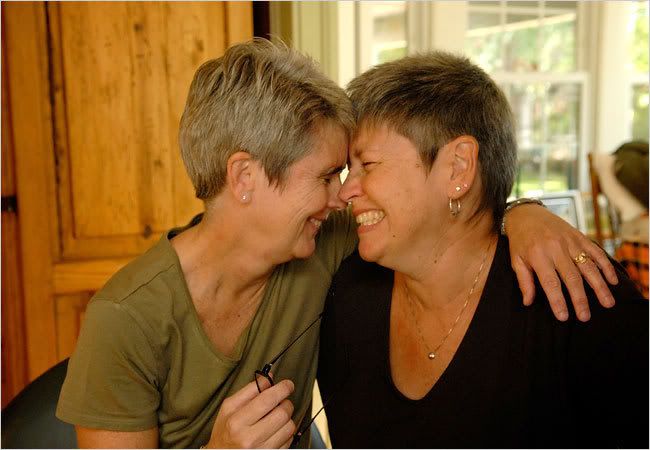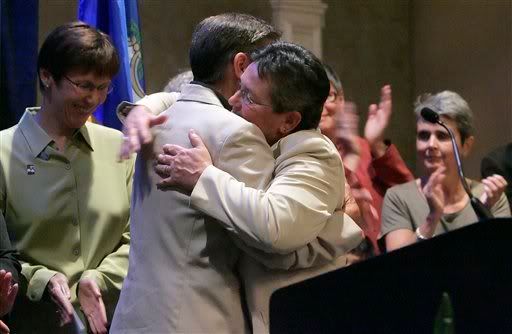This afternoon, the Supreme Court in Connecticut overturned the state’s ban on gay marriage in a 4-3 decision.
From Connecticut Supreme Court Chief Justice Richard Palmer:
We conclude that, in light of the history of pernicious discrimination faced by gay men and lesbians, and because the institution of marriage carries with it a status and significance that the newly created classification of civil unions does not embody, the segregation of heterosexual and homosexual couples into separate institutions constitutes a cognizable harm.
As I am currently living the consequences of the anti-gay marriage laws in this country, I can appreciate the joy that the gay and lesbian families of Connecticut must be feeling right now.
Although this is good news for the LGBT community in Connecticut, this could potentially help build support for the effort to ban gay marriage here in Florida. The argument that the anti-gay marriage movement is making to Florida voters is that Florida’s law against gay marriage isn’t strong enough. They argue that it is vulnerable to a court challenge that would force the state to allow gays and lesbians to marry. Today’s ruling in Connecticut bolstered their argument.
And frankly, it couldn’t have come at a worst time. A poll released earlier this week showed that support for the amendment stood at 55%, down from 57% in August, but perilously close to the 60% threshold needed for passage.
If the amendment is behind, why panic? Why support for the amendment fell a statistically insignificant 2%, the number of undecideds rose from 7% to 11%. The amendment must have the support of at least 60% of voters to pass and the current polling puts those in favor of the amendment just 5 points shy of their goal, while those opposed are 6 points away.
In this context, the news that the Supreme Court of another state had legalized gay marriage just three years after the state legislature passed civil unions legislation lends support to the right-wing argument that the courts are taking power from the people to force a “radical, liberal” agenda upon them.
To be sure, there are many other factors involved in the outcome here in Florida. Presidential politics is certainly an influence. On the one hand, there is the “Obama youth coattail effect.” The theory is that Senator Obama’s appeal to younger voters may cause this block of voters to vote in record numbers. As polling data shows that these younger voters are more tolerant of homosexuality, in general, and more supportive of gay marriage, in particular, Obama’s coattails could help deliver crucial votes in Arizona, California, and Florida.
On the other hand, there is a competing force, the “Sarah Palin God’s self-appointed Christian warrior effect.” While the Christian conservative base of the Republican Party was openly skeptical of, if not hostile to, Senator McCain during the GOP primaries, all that changed when he chose Sarah Palin. Her decision to give birth to developmentally-disabled son, her teenage daughter’s decision to carry her pregnancy to term, and her religious faith have made her a darling of the religious right. She is seen as a true believer, and her followers will flock to the polls to vote for her (not so much McCain). While they’re at it, these voters will most certainly cast a vote for the anti-gay marriage amendment.
Add to this the uncertain role that African-Americans will play in this election. As Senator Obama has the potential to become America’s first black president, it is expected that the African-American community will turn out in record numbers to support him, as during the primaries. After more than two centuries of oppression and humiliation, the African-American community is certainly justified in its pride of Senator Obama and I am excited to witness this historic election. But what affect will the increased black turnout have on the battle over gay marriage?
Supporters of the effort to ban gay marriage in California have openly thanked Senator Obama for helping bring out the black vote. Why? Anti-gay attitudes have seemingly been more pervasive in the African-American community than in the white community. It stands to reason that the more socially conservative black voters would oppose gay marriage. And that is what anti-gay activists are counting on. At the same time, some argue that black voters are no more likely than white voters to oppose to gay marriage at the ballot box.
So for now, it’s not certain how all of these events will effect the outcome here in Florida. But pushing all that aside, today is undoubtedly a victory for gay and lesbian families. This picture says it all.
From the Huffington Post:
“I can’t believe it. We’re thrilled, we’re absolutely overjoyed. We’re finally going to be able, after 33 years, to get married,” said Janet Peck of Colchester, who was a plaintiff with her partner, Carole Conklin.
Janet and Carole waited 33 years to say “I do.” How beautiful. From the bottom of my heart, I congratulate them on this historic day.
But we still have work to do. Get involved. Contact Say No on 2 for more information.


9 comments